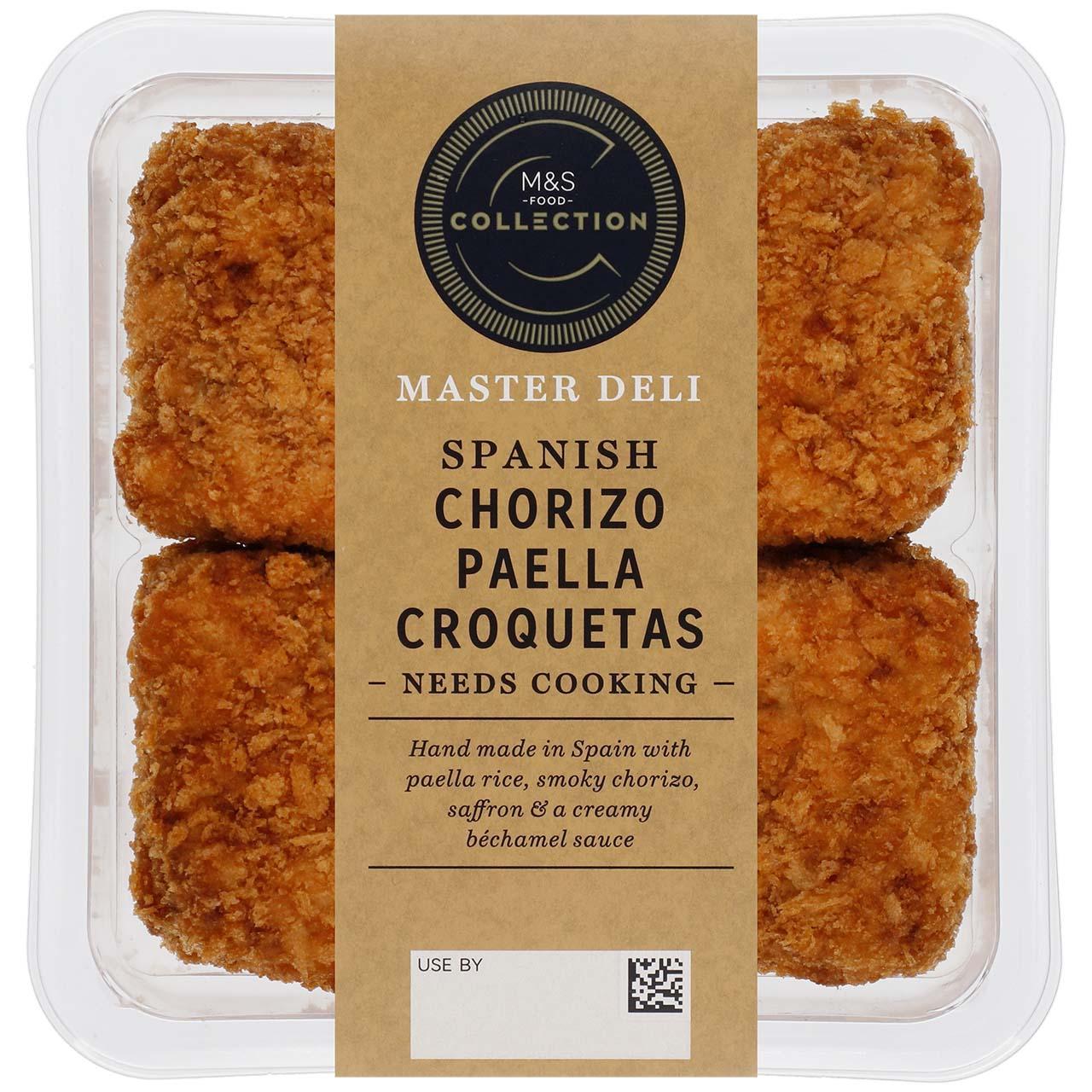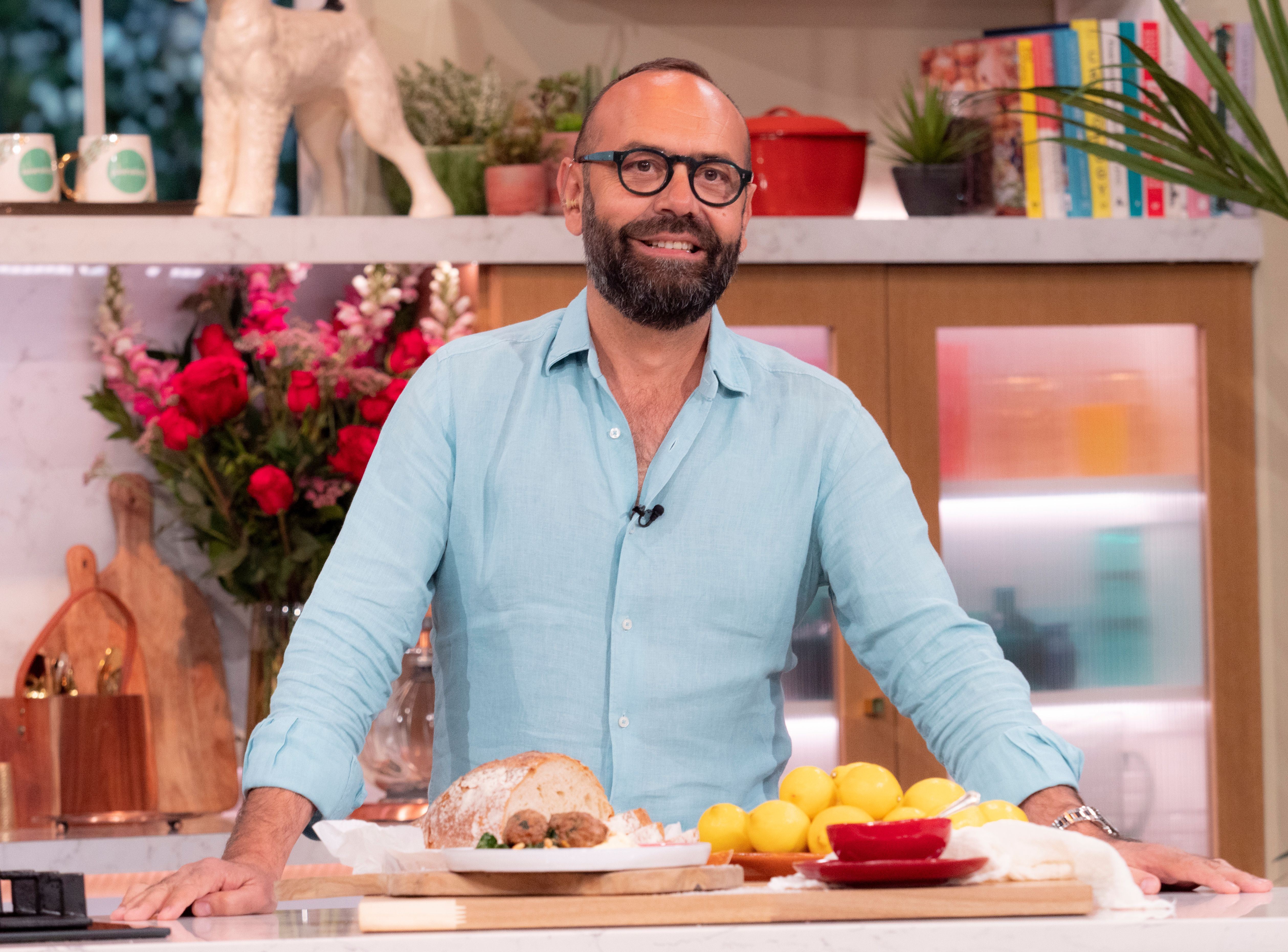The Independent's journalism is supported by our readers. When you purchase through links on our site, we may earn commission.
Why the Spanish are calling bull on M&S’s chorizo paella croquetas
When is a croqueta not a croqueta? When it is mixed with paella and chorizo and risks sparking an international incident. Here, Spanish food writer Rachel McCormack and Spanish chef Jose Pizarro give their verdict on a very British food fight...

As befits a nation that enjoys nothing better than a good raucous argument over some great food and drink, almost every town of any size in Spain has a food conference. It’s a place where producers, chefs and food journalists get together and as an attendee of these conferences over the years, I have been involved in heated debates about food, culture and commerce. I’ve also watched stressed-out chefs compete for who can make the best Russian salad and most recently at Gastrollar in the northern Asturian mountains, had a breakfast of red wine and barbecued beef surrounded by Spanish journalists and Alpine cattle.
One of the biggest of these is the annual Madrid Fusión and one of its most anticipated events is the Iberico Ham Croqueta competition. Juan Monteagudo of the Michelin-starred Ababol restaurant in Albacete won this year and the Spanish press breathlessly reported this with photos of a single oval-shaped ham-flavoured bechamel encased in glistening breadcrumbs, the platonic ideal of a Croqueta.

So, when foreigners like Marks and Spencer start selling paella and chorizo croquetas, Spanish people get upset. The British ambassador in Madrid expressed his disapproval of the dish on X/Twitter, while in Britain it has been co-opted into the ongoing culture war with headlines describing it as the latest example of cultural appropriation.
These are three things that are never mixed together and to do so is to offend Spain and its culture. There is the creamy ideal of the croqueta, then there’s paella, a dish originally from Valencia. Even today, people still fight over what makes a “proper” paella – don’t even think of describing it as “rice with things in it”...
A few years ago Spanish beer producer Estrella caused a national scandal when their summer advert showed beautiful people in the sun making a paella and frying onions to start with when a “real” paella doesn’t use onions. National media rushed to the city of Valencia and its nearby rice fields in a bid to calm the nation down and reassure them that the onionless paella was alive and flourishing.
Liliana Fuchs of the food site Directo al Paladar wrote that paella, croquetas and chorizo are three things that those outside of Spain “have never truly been able to understand”. This is an argument that highlights the clash between culture and commerce. The Spanish, like many other countries across the world, take their food traditions seriously.
In Britain, our TV chefs are constantly expected to come up with original content that can be sold as their own unique versions of dishes, thus making the chefs more marketable as original brands with new content. When our way works we can create some amazing food – try making Haggis Larb, trust me it’s fabulous – but when it doesn’t we can end up with confusing nonsense that offends entire countries. Remember Jamie Oliver’s jerk rice recipe?
As the cost of living continues to spiral it’s easy to imagine being in a development kitchen thinking up three of the main things we British associate with Spanish food and putting them together in a new dish in a bid to increase sales. What was evidently never considered was if they should.
I asked Spanish food journalist Jorge Guitán for his view. “For me, the issue isn’t a question of cultural appropriation, it’s really about whether they are a good product for the UK market,” he said. It’s not a real dish, you can find Spanish recipes for paella croquetas but ”you can find recipes for everything online, that doesn’t mean to say they are really made and eaten by people.”
However, he pointed out that while many Spaniards are annoyed at us, they do not have a great track record of their own when making other cuisines. “I recently ate a jambalaya in my hometown of Santiago de Compostela, and it was an assassination of Southern US culinary tradition and I won’t even mention the atrocities we commit here against pizza and carbonara. Perhaps we deserve this from you.”

“It’s wrong – but the word paella is the problem here”
Jose Pizarro gives his verdict on the M&S chorizo paella croquetas
“The first reaction from me was: wrong. But then you think, OK… croquetas are a very good seller. It’s fried, we love fried things in Britain. We love chorizo and we love paella.
Croquetas are usually made with leftovers. If someone has leftover paella and they make croquetas, it can be fun. I like my paella, even cold, with a big spoon of allioli. It’s absolutely amazing. But paella with chorizo? It’s mad. I’m sure you remember what happened to poor Jamie Oliver…
In France, croquettes are made with mashed potato and bechamel. When you open the croquette, you can see the bechamel inside, nice and thick. That’s the point. Spanish croquetas are traditionally made with leftover rice, though not as much anymore. If you Google paella, the recipe has only 10 ingredients. And of those 10 ingredients, one of them is water and one of them is salt. Anything else is called rice cooked in a paella pan, or arroz. That is the point. The paella is the pan.
I don’t cook any rice with chorizo in a paella pan. I might cook chorizo with rice and chicken and mushrooms, but it’s not paella. If people want to do it that way, it’s wrong, but cooking isn’t the same as it was 20 years ago. Nowadays, it’s about opening minds. It’s a very clever publicity spot. And while it sounds wrong, I haven’t tried them – if I did then they might convince me that it’s amazing.
Maybe if they hadn’t called it paella, people would be less offended. Maybe they should call it Spanish arancini instead. It’s just something that we have with paella…
Would I call it cultural appropriation? It is what it is. It’s totally wrong, but the big supermarkets always need something to sell and this is definitely something that’s going to sell a lot. And when people talk about Spain, it’s a good thing. Some people might have never heard about chorizo and paella before. For sure, they are going to hear about them now. It’s interesting; in Spain, we say bad publicity is still good publicity because they are talking about you. People are talking about Spain and it’s good! Come on!
Maybe I need to invent a very weird flavoured croqueta and put it on my menu now. M&S, call me!”
As told to Hannah Twiggs
Jose Pizarro is the author of ‘The Spanish Home Kitchen’. You can buy his book here
Join our commenting forum
Join thought-provoking conversations, follow other Independent readers and see their replies
Comments